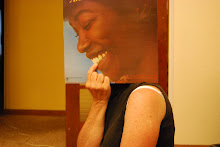 Image by Kilgub via Flickr
Image by Kilgub via Flickr
I admit that many of the talking books I have listened to have been annoying, frustrating, and sometimes so irritating that I have given up the fight & decided that I just wouldn't waste the time (e.g., "Middlesex"; see my July entry "Talking Books" .) But I have listened to a good one or two along the way ("Lord of the Rings", "People of the Book", "The Poisonwood Bible").
And so I came to Martin Amis' "London Fields" in the local library. Meaty!
 Cover of LONDON FIELDS
Cover of LONDON FIELDS
"London Fields" is read by Steven Pacey, and I think he generally does a good job. He does a New York accent, a cockney accent, an upper-class twit accent, a Jamaican-London accent, all very creditably, I think. But as with the readers of "Middlesex" and "The Unknown Terrorist", where this reader falls down, is when he tries to portray an important female character. I don't believe Nicola Six. It's not just that the accent is not very good, not like the Balkan English accents I'm familiar with. But also, Nicola's dialogue doesn't sound like it is delivered by a sexy woman, more like a chain-smoking drag queen. And so I can't buy it that all the male characters are in love with her, which is a big disadvantage for this novel, whose plot turns on her ability to manipulate the men and so bring about the climax of the novel.
On the one hand, I blame the actor for my inability to suspend my disbelief and live in the world of the novel for a couple of weeks. On the other hand, I have a nagging doubt about the novelist's skill. So I go to the critics because, as I said in my earlier entry on talking books, after my encounter with the talking book, I could not bear to read the print version now.
Most of the more recent reviewers laud "London Fields" as one of Amis' best and some go so far as to say it's a modern masterpiece. I only found one review that I was able to agree with: "What can Amis have against these minimally developed characters that he devotes nearly 500 pages to demolishing them? There's disgust aplenty here — but little else" (Library Journal). There is more damning criticism from reviews written soon after 1989, when the novel was published. But I still can't decide whether my opinion of the novel would have been different had I read rather than heard it. I know I liked "The Information", published a year or two before "London Fields", very much.
 Image via Wikipedia
Image via Wikipedia
Am I arguing with the novel or the reader?
![Reblog this post [with Zemanta]](http://img.zemanta.com/reblog_e.png?x-id=a65b374b-a799-4009-9e38-1f142f1f1a0c)

I'm not a big fan of Martin Amis though I admit that I haven't read that much of his.
ReplyDeleteI have some old tapes of Shakespeare plays and I find them easier to listen to when spoken out loud or performed than to read on the page and they seem to make more sense somehow. I find much beauty in his language and plenty of wisdom too and I don't get bored of hearing them.
That's a good idea, john. I hadn't thought of Shakespeare. It's a long time since I've read any. I will see if the library has any spoken word Shakespeare.
ReplyDelete